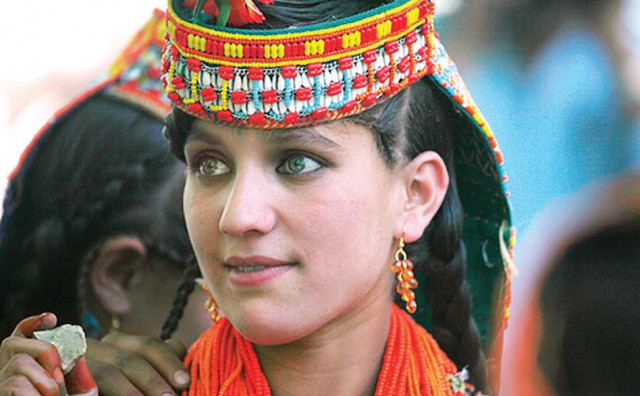Preserving Kalash culture: The big fat Greek festival
The Joshi fest is all about the Kalash endeavouring to appease their gods.

Preserving Kalash culture: The big fat Greek festival
“We are a very strange people and this is why you are here,” Engineer Khan told a small group of primarily Pakistani tourists and journalists at the Kalash Home Guest House, which he and his family operate in the village of Rumbur.
The Chitral valleys of Rumbur, Bumburet and Birir are populated by a tribe of Indo-Aryans who consider themselves the descendants of Alexander the Great. In the centuries before jeeps and satellite telephones, the lush green slopes of the Hindu Kush Range kept the Kalash separated from the region’s Muslim majority. The fair-skinned, light-eyed Kalash who now number around 3,000 developed a unique language and culture, which has been threatened in recent decades by conversion, economic and security concerns, media exploitation and internal rifts.
Subsistence farmers by tradition, the Kalash dwell in haphazard wood and slate structures with bright doors and womblike interiors, piled atop each other and wedged against the rocks. Despite religious taboos, interactions between men and women are more open than elsewhere in the region. The Kalash brew apricot wine, carve totemic symbols and disperse fragrant clusters of sage throughout their homes. Faeries carry their messages to Dezao, the creator-god, and they greet each season with collective prayer in the form of chanting, singing, drumming and dancing. Their religion centers around shamen, ritual and a vague concept of karmic communion.
In mid-May, the Kalash people hold their annual Joshi festival, which is the valley’s biggest opportunity to rake in tourist dollars. But this May, at least in Rumbur, earnings were hindered by a tense police presence that included a base camp set up in a government schoolyard. Each foreigner was assigned a mandatory guard, and a metal detector delineated the entrance to the festival grounds. Locals grumbled as they dished out free food to security forces, beginning days before the advent of Joshi.
According to Ahmed Kailash, a 28-year-old who grew up in Rumbur and studied law at Peshawar University, the Kalash have little access to formal education and limited sense of legal rights. They fear retaliation if they refuse to service security personnel.
And some Kalash feel the heavily armed presence interferes not just financially, but with the intention and sanctity of the festival.
“I am fed up,” said a Kalash man who asked to remain unnamed. “Last year they were okay with local police, this year they’re sending them all the way from Chitral I don’t see a risk. If there is a risk, they should tell tourists not to come here at all.”
During Joshi, the Kalash are free to choose spouses, even if they are already married. Festival grounds swell with young men, emboldened by wine, chatting up girls who rebuke them flirtatiously or sometimes, with genuine annoyance.
The Kalash have no written history, so the festival is also a vehicle of passing along oral tales, and some of the songs recall the glory days of Kalash leaders.
Published in The Express Tribune, May 29th, 2011.



















COMMENTS
Comments are moderated and generally will be posted if they are on-topic and not abusive.
For more information, please see our Comments FAQ